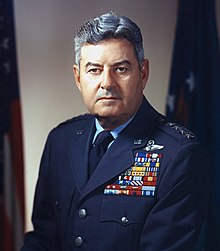
Back كورتيس لي ماي Arabic كورتيس ليماى ARZ کرتیس لهمی AZB Къртис Лемей Bulgarian Curtis LeMay Danish Curtis E. LeMay German Curtis LeMay Spanish کرتیس لهمی Persian Curtis LeMay Finnish Curtis LeMay French
Curtis LeMay | |
|---|---|
 Official portrait, c. 1950s | |
| Nickname(s) | Old Iron Pants The Demon Bombs Away LeMay The Big Cigar[1] |
| Born | November 15, 1906 Columbus, Ohio, U.S. |
| Died | October 1, 1990 (aged 83) March Air Force Base, California, U.S. |
| Buried | |
| Allegiance | United States |
| Service/ |
|
| Years of service | 1929–1965 |
| Rank | General |
| Commands held | |
| Battles/wars | |
| Awards | |
| Alma mater | Ohio State University (BS) |
| Spouse(s) |
Helen Maitland (m. 1934) |
| Children | 1 |
| Political party | Republican |
| Other political affiliations | American Independent (1968) |
Curtis Emerson LeMay (November 15, 1906 – October 1, 1990) was an American Air Force general who implemented an effective but controversial strategic bombing campaign in the Pacific theater of World War II. He later served as Chief of Staff of the United States Air Force, from 1961 to 1965.
LeMay joined the United States Army Air Corps, the precursor to the United States Air Force, in 1929 while studying civil engineering at Ohio State University. He had risen to the rank of major by the time of Japan's attack on Pearl Harbor in December 1941 and the United States's subsequent entry into World War II. He commanded the 305th Bombardment Group from October 1942 until September 1943, and the 3rd Air Division in the European theatre of World War II until August 1944, when he was transferred to the China Burma India Theater. He was then placed in command of strategic bombing operations against Japan, planning and executing a massive fire bombing campaign against Japanese cities and Operation Starvation, a crippling minelaying campaign in Japan's internal waterways.
After the war, he was assigned to command USAF Europe and coordinated the Berlin Airlift. He served as commander of the Strategic Air Command (SAC) from 1948 to 1957, where he presided over the transition to an all-jet aircraft force that had a strong emphasis on the delivery of nuclear weapons in the event of war. As Chief of Staff of the Air Force, he called for the bombing of Cuban missile sites during the Cuban Missile Crisis and sought a sustained bombing campaign against North Vietnam during the Vietnam War.
After retiring from the Air Force in 1965, LeMay agreed to serve as pro-segregation Alabama Governor George Wallace's running mate on the far-right American Independent Party ticket in the 1968 United States presidential election. The ticket won 46 electoral votes, 5 states, and 13.5% of the popular vote, a strong tally for a third party campaign, but the Wallace campaign came to see LeMay as a liability. After the election, LeMay retired to his home in Newport Beach, California, and he died in 1990 at age 83.
© MMXXIII Rich X Search. We shall prevail. All rights reserved. Rich X Search